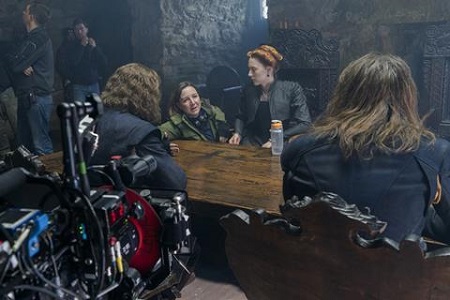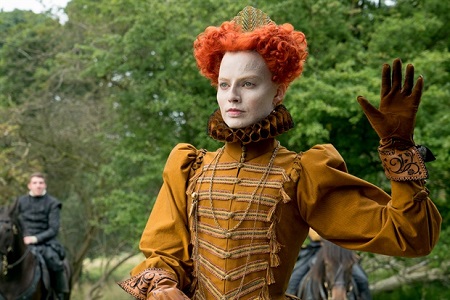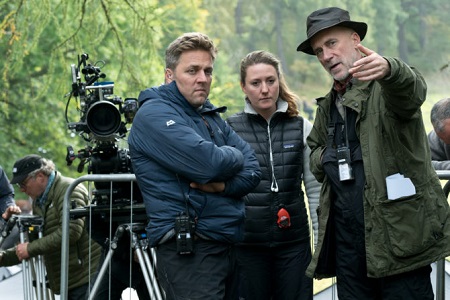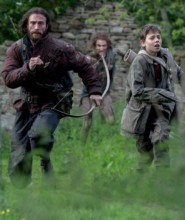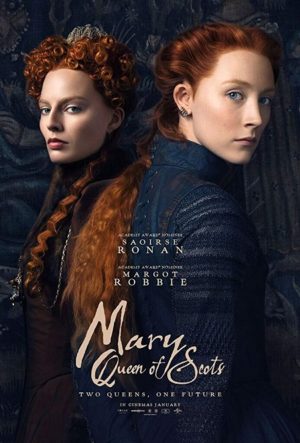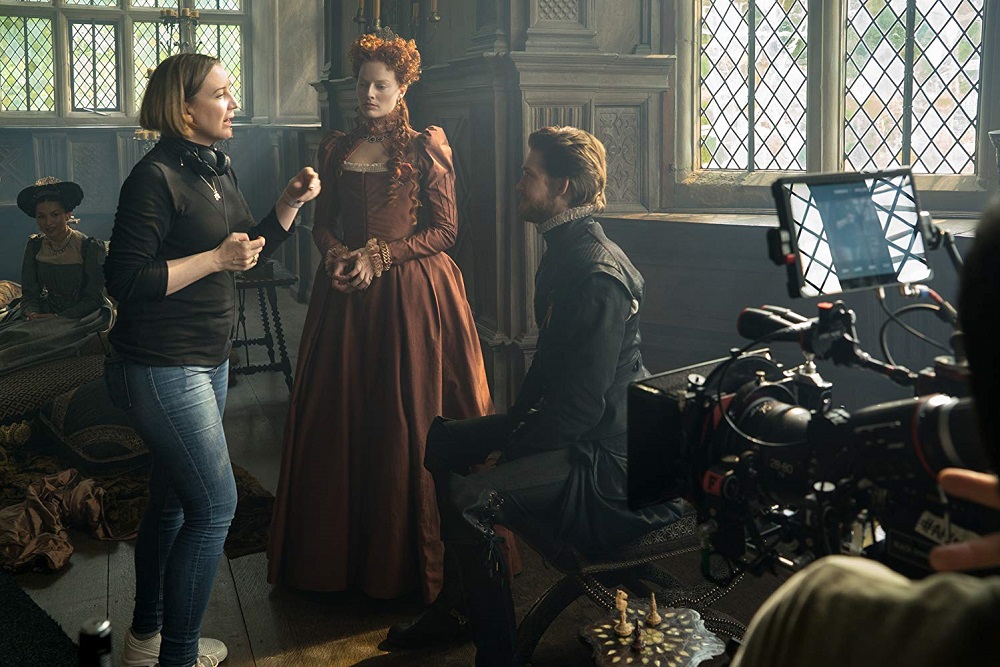
“Mary Queen of Scots” – Interview with Josie Rourke
by Sara Michelle Fetters - January 11th, 2019 - Interviews
The Future is Female
Director Josie Rourke makes the leap from the British stage to direct Mary Queen of Scots
Adapted from the biography Queen of Scots: The True Life of Mary Stuart by Dr. John Guy, director Josie Rourke and screenwriter Beau Willimon have crafted the female-driven historical epic Mary Queen of Scots. The movie chronicles the period of 16th century history where Catholic Mary Stuart (Saoirse Ronan) returned to her native Scotland, not mostly under Protestant control, to take her rightful place upon the royal throne. Not only does the film deal with how she attempts to rule her country in the face of violent opposition and underhanded political subterfuge, it also looks at the relationship she has with the British monarch Queen Elizbeth (Margot Robbie). It is a fast-paced, undeniably fascinating jaunt back in time, this examination of these two women and the level of opposition they continually were faced with, mainly by the men who felt they should be in power, mirroring current 21st century events in a number of eerie, sometimes unsettling ways.
After opening in limited release back in early December, Mary Queen of Scots is expanding nationwide this week. A few days just before New Year’s Day had the opportunity to get on the phone with the Josie Rourke and briefly discuss exactly what it was that drew the esteemed British theatre director to make her motion picture debut handing this project. Here’s some of what she had to say:
Sara Michelle Fetters: I wanted to ask you, initially when the project came your way, were you already familiar with Dr. John Guy’s book? Were you already interested in this story?
Josie Rourke: I was not familiar with Dr. Guy’s book. I did know to some extent the story of Mary Queen of Scots because I’m a theater director by trade. I’ve directed a lot of plays set in that period of history. As you know, Shakespeare was writing around that time. Christopher Marlowe. That group of playwrights from that time period, English playwrights in particularly.
So I’ve had to do a ton of research about that period in order to direct plays that were written then. I knew about Mary Queen of Scots. I mean, I had this kind of sense [about her] that was validated by John’s book. I call it a kind of Spidey Sense that Mary had perhaps been done something of a disservice by how she’d been portrayed by history. One of the great things about John’s book, and why I was so pleased to light upon it when I found it, was that it really is a revisionist take on Mary’s story. It goes back into the archives and shows really how her reputation was done serious damage both by people in her own time and in the subsequent years. She was painted as kind of incompetent. Whereas, actually John takes her much more seriously as a political figure.
Sara Michelle Fetters: I really love the way that in Beau’s script it shows how history can be so unkind. How it can just be so unkind to women, especially women in power.
Josie Rourke: Completely. I think that that’s in a number of ways, isn’t it? One of those ways is that it’s just incredibly hard, particularly then, and probably still now, for these women to be taken seriously, for them to be within Mary’s own time to be thought of by significant political figures, such as John Knox, as anything but an aberration. I mean Knox genuinely thought that the rule of Mary was against God and against nature, and that was what he felt about women monarchs in general. It’s funny, some people have sort of said or written that this is a kind of feminist take on it or there’s a sense what we’ve done is re-written history in order to make it feel contemporary, whereas actually what we’ve done is just shown this history in a way we’ve not seen before.
Sara Michelle Fetters: Was there trepidation on your part? I mean, you’ve had such an amazing and successful career directing productions for the theatrical stage, jumping into a project of this scale, was there any hesitation? Or did you just know immediately and just put both feet in and go for it?
Josie Rourke: I’ve been offered screenplays and movies before. This felt like the right one to begin with in contrast to a bunch of the stuff that I’d been offered and spoken to people about. Saoirse was attached to it and that made it very, very appealing to me, and I could see how she could be extraordinary as this woman.
I think what you do next in order to get your confidence is you build out a team. The next person to come on board after Saoirse was Beau, who’s been a great friend for many years now. This gave me huge strength in the team. Finding John’s book, that was another big step.
One of the great things about having that experience in the theater is that is you’re very used to collaborating, and I felt confident in being able to build a cast around Saoirse and around the project that I could get the very best from. It would be wrong for me to say that it’s not with a degree of fear that one approaches a project of this scale, but you know, I’m fearful the day before I start rehearsal on a play. That’s a necessary part of being alive, I think, and being an artist. If you stop feeling that, then it’s probably time to give up, isn’t it?
Sara Michelle Fetters: Totally. I completely agree.
I loved the naturalistic chemistry of everyone in the film. Even when all the characters are working at cross-purposes from one another. All of those group scenes with Saoirse, it was Mary Stuart’s world. I honestly believed they were all living there at that point in history.
Josie Rourke: Oh! What an amazing thing to say. Thank you.
That was one of our main aims, just to make you believe these people actually existed and to humanize them, to understand how these figures actually lived a human life as well as being these great icons. Rehearsal was very helpful. We all got to spend a lot of time together working on the screenplay and rehearsing, and some scenes were done before we started. We also worked with a lot of the movement with this amazing choreographer, Wayne McGregor. He just got people very comfortable in their clothes and in their own skin with the characters. That was a big help, I think.
Sara Michelle Fetters: How hard was this film to cast?
Josie Rourke: That was one of the great joys, really, for me. I love casting. It’s one of my favorite parts of the process. I both direct and also work with a team when I cast a project, and we’ve done six, seven theatrical shows this year already. So casting, it’s a big part of what I do, what I think about all the time, and I think it’s part of my role as director to be able to look at an actor doing one very particular thing and imagine and extrapolate how they might be able to do a very different one.
Sara Michelle Fetters: How important was it to you all to stay historically accurate but then to also balance that with telling a great story?
Josie Rourke: I think that there were two decisions to diverge from accuracy. One of which is in the meeting of the two queens, which never happened, although it’s always impossible to dramatize this story between them without that happening and I think that’s probably why dramatists have been doing that for over 200 years. I mean, the first person to write that scene was a German playwright in 1800. Friedrich Schiller wrote it in Mary Stuart and that’s one of the most famous plays in German. You know, Katharine Hepburn played that scene as Mary in Mary of Scotland. The two queens together, it’s a famous scene even if it’s not a factual moment in history. We felt in order to tell the essential truth of their relationship, even though they wrote all these letters to each other, rather than just have the letters and rely only on those we wanted to have that one great scene where they meet.
The other way in which it diverges is in representation. There are people of color playing characters who might have been white. But that’s a thing about my work. It’s always been true in theater. You can do that. I don’t tend to direct all-white productions of anything really. So that was that, but everywhere else, although you have to make choices from the evidence about the story of Mary Queen of Scots, everything else cleaves pretty closely to the history. We may have compressed time here and there, but it’s based on Dr. Guy’s absolutely excellent book that is one of the most painstakingly researched histories about Mary that’s around.
Sara Michelle Fetters: I don’t want to talk about it too much just because I don’t want to spoil it for people, but the scene in Mary’s room where things get deadly. It is such an extraordinary moment. That had to be an emotional day, I would assume.
Josie Rourke: It was a deeply emotional day and also, talking about historical accuracy, that we embraced what actually happened. You could say it’s an assassination or an attack, nearly 50 men charging into Mary Stuart’s chamber. You can actually visit the room in Holyrood that they charged into in order to commit that murder. We had the same number of men on the day as there were on that fateful day in history, and that was just logistically incredibly complicated to actually shoot and work out all those bodies. But it did give you that visceral sense of what it must have been like.
We talk about being faithful to the history, but that was one of the moments where being faithful to the history brought incredible temperature to the drama and also just made it extremely visceral. We were just recreating something that had happened and a lot of people feel that actually that was done in order to potentially make Mary miscarry. It was an act of terror as much as it was an act of violence. We all felt that that day, I think. It was definitely emotional.
Sara Michelle Fetters: I do have to ask, for Margot, did she feel any pressure stepping into her role? I mean there’ve been so many great actresses, obviously most recently with Cate Blanchett, who have portrayed Queen Elizabeth. Yet she really does make it her own.
Josie Rourke: She does. I agree. She’s wonderful.
In answer to your question, I think she felt so much pressure that she initially said, “no.” [laughs] I think partly because she was so aware of the extraordinary history of actresses who’ve played this role. That’s a great testament to Margot’s humility, that she wouldn’t necessarily just want to take the big, shiny thing that’s in front of her but that instead she’s weighing herself carefully against what she feels she can do and what she has the ability to do. One of the ways in which I convinced her to do it was I wrote her a, we can call it a letter like in the film but in reality it was a long email, saying, “Look, I understand why this is daunting and that’s amazing that you have that correct respect to those actors who have played this role before you, but I really want you to play, not this icon, but this woman and get to an essential truth of what she was like as this young woman.”
And Margot said she felt she needed help to do that, and I also wrote to her that I wanted her to know that the thing I’ve done for 15 years of my career is to help actors prepare and that I’d help her prepare for it. I think that gave her the confidence to take it on and it was the beginning of a great creative relationship between her and me because we both really dived into that preparation together. We had a really good and fluid way of working together and great reference points. I understood what she needed as an actor and how to really help her find the best in her performance. It was a very joyful process.
Sara Michelle Fetters: Margot does not have as much screen time as Saoirse does, and yet she’s still able to build a three-dimensional character, so when we see her in that moment with the two queens together, we’re devastated by what Elizabeth does and says there.
Josie Rourke: I think one of the ways in which she does that is in every single scene, no matter what the scene is that she’s playing, she’s thinking about Mary. We would say in acting terms, this was her point of concentration. Mary is her point of concentration. In a way Elizabeth manages to be such a big part of this story by being all about THE story, which is Mary’s story.
Sara Michelle Fetters: Back to Saoirse for a moment. Could you imagine making this film without her?
Josie Rourke: No. I made this film because of her, really. It was Saoirse Ronan as Mary Queen of Scots. From the beginning. It wasn’t Mary Queen of Scots with Saoirse Ronan that got me involved.
Sara Michelle Fetters: In some ways it just makes me angry to think that this is a 16th century story but it’s also about things that are happening right now here in the 21st century. It’s like we haven’t changed at all.
Josie Rourke. Yeah. That’s true. But, then, that’s the Renaissance, right?
The Renaissance. That’s when so much of contemporary politics as we understand it was invented. A lot of the handbook that people are still reading now about politics in the 21st century were written in the 16th century. Machiavelli wrote The Prince. That’s why we call people Machiavellian in that period and I think, and I’m not delegitimizing your anger, I think you’re right, but I also think we have to understand that the DNA of modern politics is in this moment of Renaissance history. If we are unsatisfied with what is happening now, one of the things we need to do is remind ourselves what happened then and to my mind particularly look back at the lives of women in politics and how they are portrayed and presented and often undermined. We need to look back and say these heinous actions and policies actually had their roots in this period.
Sara Michelle Fetters: For you personally, what did this movie end up meaning to you? Where do you see yourself going from here?
Josie Rourke: Yeah, I’m completely hooked on the movies. I had an extraordinary time with this. I’ve always known cinema’s power as an audience member, but to understand its power a little better as a director has been an amazing thing. Honestly, it’s helped me feel in different ways how vivid people’s response to this movie has been. To be in the kind of conversations where people are saying, “It feels so now.” Having them comment on how no is just like it was 500 years ago and wondering if that is a good thing or a bad thing, wondering what do we need to do. That’s been incredible. I think one thing that’s been consistently great is to understand what a cultural impact [the movie] can have.
To be in a debate with people about whether or not the Renaissance was actually queer. Like the number of opportunities I’ve had to say to people, “No, no, no, you don’t understand. It was a different kind of tolerance, but there was tolerance in that period.” To think that the history of people being comfortable with a sexuality other than heterosexuality simply is a product of the past, I don’t know, 50 years of human history. It is also wrong. I think there’s a very interesting set of cultural conversations that the movie has sparked about representation, about where we think our history might be in our sexuality, in our feminism, in our rights, in our ability to express who we are, in representation. That’s been amazing to me. Like the vividness of that and the ability of the film to have that reach and spark those debates, I find that genuinely exciting. I’ve worked in theater for 15 years, and theater’s about sparking conversation, so it was amazing to realize how great a conversation a film can start. That’s really cool.
Sara Michelle Fetters: And what do you want audiences to take away when they leave the theatre? What do you hope they’re talking about?
Josie Rourke: I want them to understand how much extraordinary dimension and power there is in these two women, Saoirse Ronan and Margot Robbie, as actors because I think these are absolutely exciting and important performances. That’s the first thing I think that will resonate for them. The other thing is that I hope that by showing our political history from the perspective of a woman director that there’s an opportunity for people to think about what power was then and what it is now, because the terrible thing about Mary Queen of Scots is that her downfall was not her incompetence. It was her compassion. It was that she forgave. There is a cruelty to that world that is vivid and awful and demands sacrifices of your compassion and of yourself that I don’t think has necessarily stopped in contemporary politics.
– Interview reprinted courtesy of the SGN in Seattle
